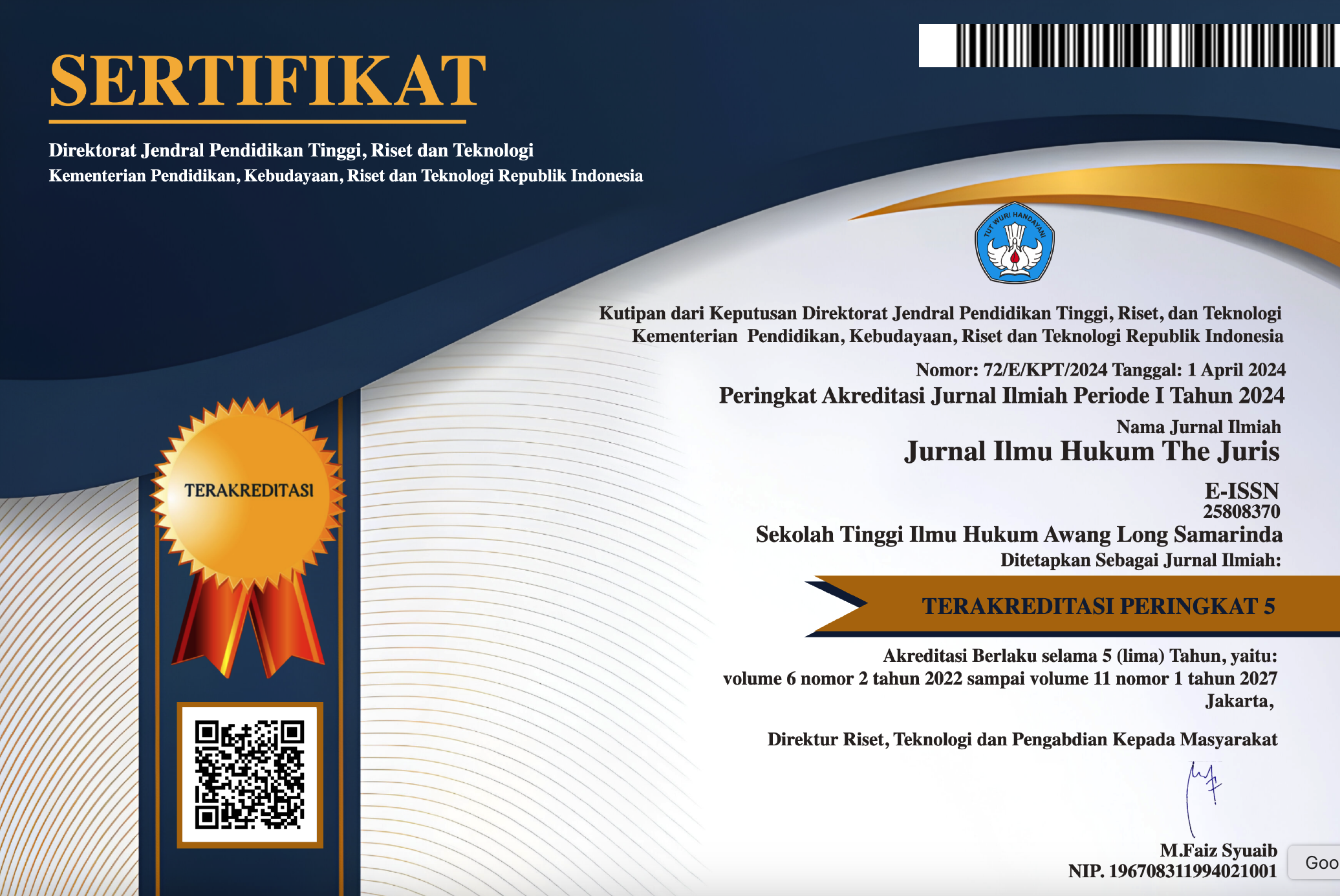ANALISIS PERBUATAN YANG DAPAT DIKENAKAN SINGER MENURUT HUKUM ADAT KALIMANTAN TENGAH DALAM PERSPEKTIF HUKUM PERDATA
Abstract
The customary law still in effect in Central Kalimantan, particularly among the Dayak Ngaju tribe, serves as a means of social control and governance. This study employs normative legal research methods and qualitative research types with a statutory approach. In Dayak Ngaju customary law, "Singer" refers to a sanction in the form of a fine. Established in 1984 during the great Tumbang Anoi meeting, the Singer was intended to put an end to hostile traditions between Dayak sub-tribes, such as headhunting and slavery. The fine acts as a form of atonement to avoid divine retribution and the wrath of nature's guardians. The primary objective of Singer is to deter individuals, making them aware of their wrongdoing and preventing recurrence. Offenses subject to customary sanctions include environmental destruction, violations of social norms, criminal acts, infringements on customary rights, and disobedience to customary law. Customary fines may consist of goods, animals, or money, often accompanied by rituals to restore communal balance. For legal certainty, the regulation of the execution of Dayak customary court decisions should be codified into clear written law, specifying the authorities responsible for enforcement and penalties for those who fail to pay the Singer.
Downloads
References
Apriyanti, R. (2018). Keberadaan sanksi adat dalam penerapan hukum pidana adat. Universitas Mulawarman, 6(1).
Citranu. (2021). Pengaturan dan akibat hukum tidak dilaksanakannya putusan peradilan adat Dayak. Institut Agama Hindu Negeri Tampung Penyang Palangka Raya, 6(1).
Fariduz, I. (2024, February 8). Sumber hukum adat. Pinter Hukum.
Haar, T. (2014). Hukum adat Indonesia. Bandung: Nuansa Mulia.
Hadikusuma, H. (2019). Pengantar ilmu hukum adat Indonesia. Bandung: Mandar Maju.
Ihromi. (2021). Antropologi dan hukum. Jakarta: Yayasan Obor.
Kitab Undang-Undang Hukum Perdata (Burgerlijk Wetboek voor Indonesië), Staatsblad Tahun 1847 Nomor 23.
Marzuki, P. M. (2016). Penelitian hukum. Jakarta: Kencana Prenada Media Group.
Peraturan Daerah Provinsi Kalimantan Tengah Nomor 16 Tahun 2008 tentang Pedoman Pengakuan dan Perlindungan Masyarakat Hukum Adat (Lembaran Daerah Provinsi Kalimantan Tengah Tahun 2008 Nomor 16, Tambahan Lembaran Daerah Provinsi Kalimantan Tengah Nomor 24).
Peraturan Menteri Dalam Negeri Nomor 52 Tahun 2014 tentang Pedoman dan Perlindungan Masyarakat Hukum Adat (Berita Negara Republik Indonesia Tahun 2014 Nomor 951).
Supomo. (2018). Bab-bab tentang hukum adat. Solo: Universitas Solo.
Undang-Undang Dasar Negara Republik Indonesia Tahun 1945.
Undang-Undang Nomor 6 Tahun 2014 tentang Desa (Lembaran Negara Republik Indonesia Tahun 2014 Nomor 7, Tambahan Lembaran Negara Nomor 5495), sebagaimana telah beberapa kali diubah, terakhir dengan Undang-Undang Nomor 3 Tahun 2024 tentang Perubahan Kedua atas Undang-Undang Nomor 6 Tahun 2014 tentang Desa (Lembaran Negara Republik Indonesia Tahun 2024 Nomor 77, Tambahan Lembaran Negara Republik Indonesia Nomor 6914).
Wiranata, I. G. (2005). Hukum adat Indonesia dari masa ke masa. Bandung: PT. Citra Aditya Bakti.
Copyright (c) 2024 Yoke Shintia Putri, Joni, Tasrifinoor

This work is licensed under a Creative Commons Attribution-ShareAlike 4.0 International License.







